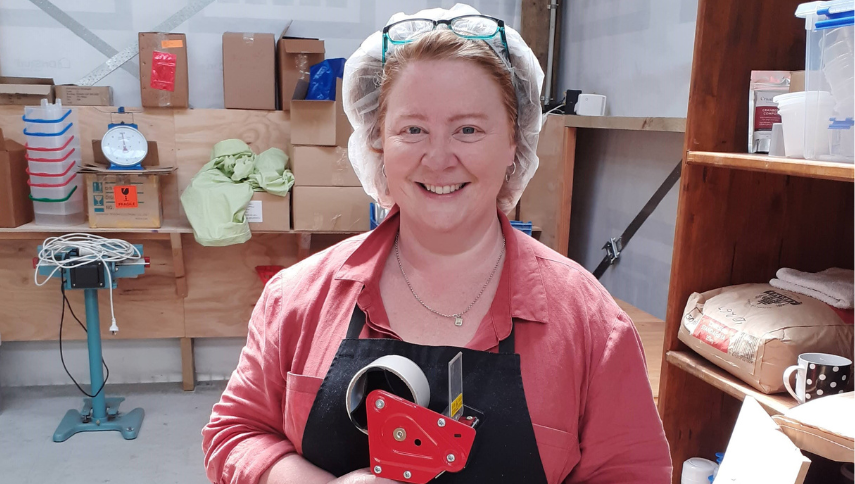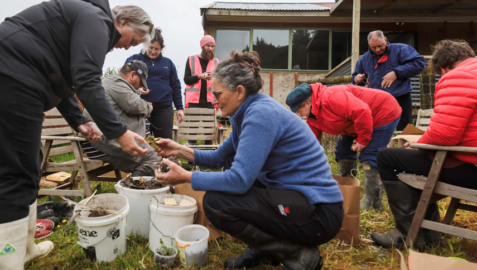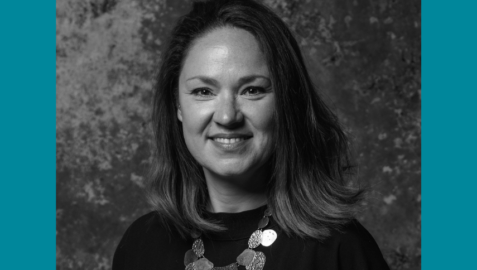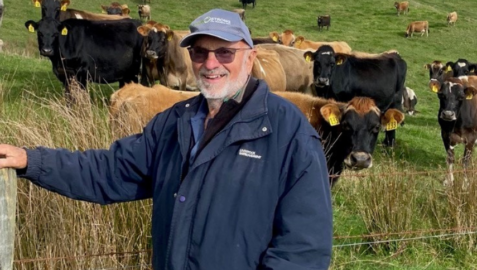
The Fine Art Of Farming
Module Overview
Cranberry business owner and artist Kate Buckley is helping West Coast farmers and growers get off farm and get creative.
Tell us about your background.
I’m originally from Ireland but I live in Hokitika and like many people in this part of the world, I juggle a few different jobs. Our family business is a cranberry farm. My partner Kevin and I run Cranberries Westland, the only commercial cranberry farm in New Zealand. We used to farm deer in the central North Island and shifted here from Taihape.
You’re also a renowned artist. I read that your work appears in prestigious art collections here and in Ireland. How did you come to be in NZ?
It’s the oldest story in the world really. A holiday romance with a Kiwi farmer I met in Ireland. After a few years of extended visits one of us had to move, so I put my paintbrush in my back pocket and emigrated to NZ in 2005.
Ok, back to the cranberries. What sort of season has it been?
Cranberries like high rainfall and acid soils and we have both of those in spades on the coast. We’ve had another great summer, finished harvesting in April and we’re going into a quieter time now until we start cooking and make a range of shelf products to supply nationally.
What’s your role in the business?
I run the office, sales and cooking and my partner Kevin is the one growing the cranberries. He’s flat out at harvest and I’m busiest towards Xmas so we can support each other at our busiest times of the year. We have clearly defined roles and that’s probably one of the reasons it works so well – I’m sure that’s true of many farms. [laughs].
What are the main challenges?
There’s nobody else growing cranberries commercially in NZ so there are challenges that come with not having others to meet and problem solve with. For the business, a lot of pressure comes from the sheer volume of compliance and paperwork required to supply the market. For me personally, I suppose it’s the isolation of sitting at a desk in our home office. I need social outlets to balance that.
Sounds like you’ve come up with the perfect solution because you also organise art classes for your local community, don’t you? Tell me more about that.
Yes, I coordinate the Art4Me programme which provides a space for adults to come and work on their own creative projects. We’re part of a national network of Creative Spaces and we work as part of the local REAP, WestREAP. Basically, we provide space, materials and tutors so that anybody from the community can come and do their stuff.
When did it start?
It started in 2015 with one group and now we work with about 100 people a week and have seven programmes running across the Grey and Hokitika district. We work with tutors who are based in these rural communities and support them to host creative spaces.
What are you hoping to achieve?
One of the key benefits of the programme is the way it connects rural people who would not normally meet and work together. The friendships and support that develops between group members is one of the most important aspects. So, we’re using the arts to bring people together and support greater wellbeing and connection. I would describe it as a 51% wellbeing, 49% art programme.
If I sign up, what’s involved?
The programme runs 40 weeks a year – that’s every week during term time. Group size varies and most groups have two tutors. We try to make the classes accessible for wherever the person is at in their life, so people are welcome to come and go from the programme as their lives allow.
Who shows up?
We attract people from all walks of life including local farmers and growers. About 20% of the people attending are men.
What feedback have you had from farmers?
This is the thing that gets me off farm. This is where I make friends and connect. That sort of stuff. But once somebody completes their first picture or piece and makes their first sale, it gives them such a boost that their interest usually snowballs from there.
Farmstrong encourages farmers to be proactive about their wellbeing. Is there a link between building resilience and activities like art?
There’s a huge link. It’s been interesting for me to look at the Farmstrong website because it’s made me think, ‘That’s exactly what we’re doing’.
Take Farmstrong’s 5 Ways to Wellbeing, for example. We’re connecting people, it’s getting them off-farm, they’re learning new skills, they’re keeping active, contributing to their community and enjoying the simple pleasures of life. It ticks all of those boxes. And the research shows that creative activity increases people’s resilience and ability to take on other challenges in life.
It can be difficult to conjure up these opportunities when you’re working in isolation on farm.
Exactly. The beauty of art is that you can connect with others to do it, but can also continue at home by yourself, even if you’re really busy. It’s a very practical and achievable way to recharge mentally.
If I’m finding winter a bit of a slog on farm, why should I come along to one of these sessions?
Well, at the most basic level, it’s a welcoming place to work on a creative project. It’s pretty much free – $5 if you can manage it. You can come when it suits you, so there’s no pressure about attending. We supply all of the basic materials and our tutors are skilled so when you come with an idea we can help you to work on that. And then it’s something you can take away and work with on your own time.
Do you plan to grow the programme?
We’re keen to get more farmers and growers involved. When you’re living in a very isolated area like this it’s important to offer activities that will work in with people’s jobs, family commitments, lifestyle and the realities of the climate here.
There are only so many things you can do in a rainforest on a rainy day and one of them is art.
Farmstrong is a nationwide, rural wellbeing programme that helps farmers and growers manage the ups and downs of the industry. To find out what works for you and lock it in visit www.farmstrong.co.nz

Kate Gardner is a dry stock farmer as well as a stained glass and mosaic tutor. She has a workshop at her farm where she teaches regularly. “I like the way art allows me to get out and do something different and have a different focus. I really enjoy seeing the look on the people’s faces when they’ve created something that they’re proud of.”
“The sort of feedback I get from people is, ‘I love this time of the week where I can just focus on my art and leave all the other baggage behind.’ I think it’s important for farming people to have other outlets. It’s just about finding the thing you like to do and makes you happy.”


